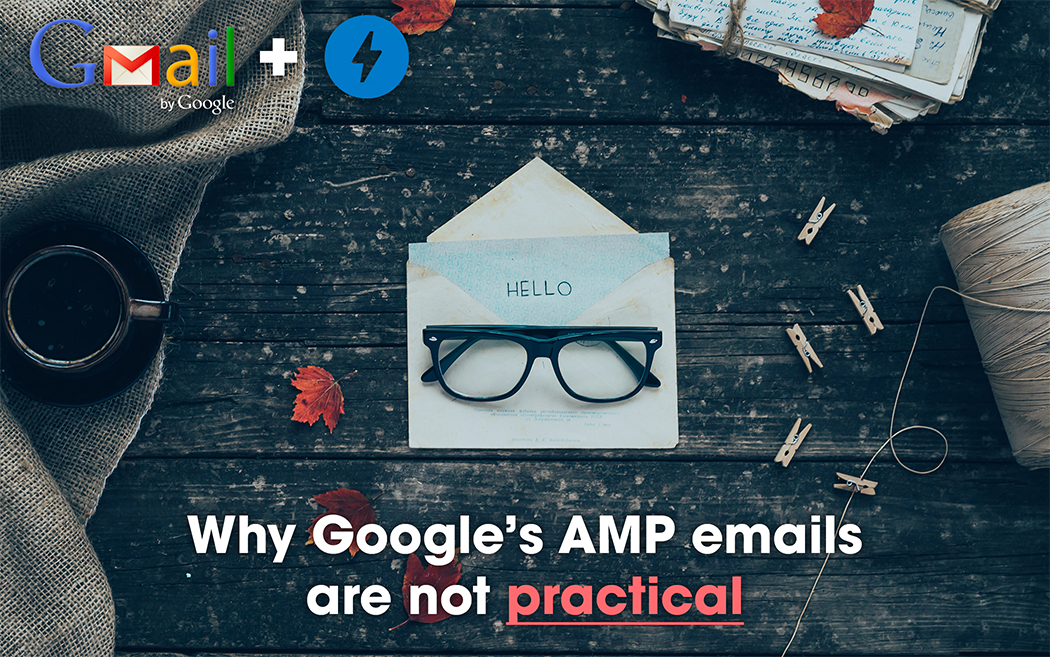Google recently announced that they will be supporting Accelerated Mobile Pages (AMP) in emails, and it sent the tech world into a frenzy. Think of all the possibilities this would unlock, allowing marketers to send interactive components (widgets) to their audience, allowing users to interact with emails and receive live instant feedback. Imagine being able to send someone your calendar and giving them the ability to reserve a 30-minute slot right there & then for your upcoming meeting, without all the back & forth. That would be great.
However, in reality, there is a huge elephant in the room that people seem to be overlooking. In order for this to work, the receiver needs to be on a Gmail client. This limitation immediately rules out all the people using Outlook & Apple Mail. These two clients alone account for over 60% of the email client market (as of July 2017) on mobile alone (Outlook has a much greater stranglehold on the desktop market due to the Enterprise audience).
As a sales representative looking to close a potential lead, if there is even a 50% chance (and there is) that the prospective customer I am reaching out to will not be able to interact with the ‘Live Calendar Widget’ I am sending them to schedule our upcoming meeting, I just can’t risk sending it. As a marketer, when I am executing an email campaign, if I can’t be certain that a huge percentage of my audience (95% or up) will get the proper experience I am crafting, I can’t possibly send out that email. These are real-world limitations.
Need to build an amazing web application?
With cross platform compatibility, web apps remain the ultimate medium for a product. Tell us about your project for a free consult.
Now of course, Google must have thought of all of these limitations. They can (and probably already have) implement fallback options which display an alternate, more static version of that email to those without a compatible client. However, this simply adds more overhead to content marketers.
There’s no doubt this opens a few doors and creates lots of potential avenues for people in several industries to pursue – however, it also opens up areas which need a lot more debate and thought before it can be considered ready for prime time. Our feeling is that this might take a while. Luckily, this project is still in developer preview and being thoroughly ironed out before being released to the general public. Even then, Google is known for keeping things in beta for a very long time (remember Gmail?), so there is reason for optimism. There’s still a very long way to go. We’ll be keeping a close eye on this technology as it continues to mature.
Learn more about how to Design Amazing & Progressive Web Apps and mimicking the best qualities of web and native applications.
 Web Applications
Build web apps using cutting-edge technology
Web Applications
Build web apps using cutting-edge technology
 Business Intelligence Apps
Empower your business with fast & actionable BI Apps
Business Intelligence Apps
Empower your business with fast & actionable BI Apps
 Mobile Applications
Build cross-platform apps for iOS and Android devices
Mobile Applications
Build cross-platform apps for iOS and Android devices
 Internet of Things Apps
Streamline your operations with cloud-based IoT apps
Internet of Things Apps
Streamline your operations with cloud-based IoT apps
 AI Products
Unlock the power of AI & ML with our expertise
AI Products
Unlock the power of AI & ML with our expertise
 Minimum Viable Product (MVP)
Mitigate risks & accelerate your project development
Minimum Viable Product (MVP)
Mitigate risks & accelerate your project development
 Enterprise Software
Build custom enterprise solutions for your business
Enterprise Software
Build custom enterprise solutions for your business
 Software as a Service (SaaS)
Scale your business with ease and cost-efficiency
Software as a Service (SaaS)
Scale your business with ease and cost-efficiency



